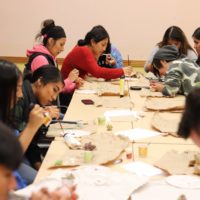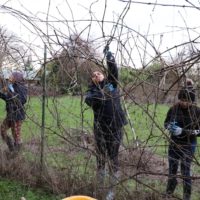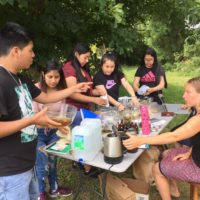As a child, Jaime Arredondo’s hands were often stained from picking strawberries during the summer in Salem, where his family arrived from Mexico when he was eight.
“I used to hide my hands, so people wouldn’t know what I did during the summer,” he says. Growing up, his number-one goal was to leave farm work. Now, Jaime is leading a program to reconnect Latinx high-schoolers with their indigenous farming roots, replacing shame with empowerment.
Jaime is the Executive Director of the CAPACES Leadership Institute (CLI) in Woodburn, which builds leadership for social justice within the Oregon Immigrant and Farmworker Movement. That mission begins with young people through the TURNO program, which creates a pathway for high-schoolers—mostly from farmworker families—to rediscover themselves, serve the community, access higher education and emerge as leaders for social change.
With support from the Gray Family Foundation, TURNO youth are learning how to germinate seeds, grow vegetables and care for the land—starting with the community gardens at the farmworker housing in Woodburn.
When one TURNO student told his mom about growing chayote, an indigenous squash popular in rural Mexico but rarely seen in the states, it struck up a conversation.
“They started talking about these foods they grew in their native land, and the ceremonies they did with their grandparents that they hadn’t participated in since they left their country,” Jaime says.
Students invite abuelos and abuelas to once again experience these traditional ceremonies, which honor Mother Earth at the beginning and end of each growing season. Family by family, these experiences are cementing the program’s wisdom in the community.
What started as just seven youth in the program has grown to 20 in 2019. Someday, Jaime hopes that the TURNO community will produce a pipeline of future farmers.
“It’s just starting to take off,” Jaime says.
With the program thriving, the next step is to take TURNO to the MacLaren Youth Correctional Facility to help incarcerated youth reconnect with the land through gardening and cooking onsite. The hope is that these skills will help them eventually transition back into the community.
“Because it involves food and agriculture, there’s no limit. It’s just going to grow like a seed will grow, if we nurture it.”



